GALLUP NEWS SERVICE
PRINCETON, NJ -- The cover story on this week's Newsweek, titled "Bush and God," focuses on George W. Bush's deep religious beliefs and how they might be affecting his presidency -- and in the current environment, his foreign policy. The article reviews the history of Bush's conversion to an evangelical Protestant faith in the 1980s, and looks at the way in which Bush and his political adviser, Karl Rove, targeted the religious community in their gubernatorial election campaigns in Texas and in their 2000 presidential campaign.
The fact that this conservative and deeply religious president is a Republican, is directly in line with the overall pattern of religious beliefs in American politics. Most scholars agree that there is a substantial relationship between strong religious faith, particularly within conservative, evangelical Protestant denominations, and identification with the Republican Party. Those Americans who are less intensely religious tend to identify themselves as independents and Democrats. As Vanderbilt University political scientist Geoffrey Layman summarized in his recent book, The Great Divide: Religious and Cultural Conflict in American Party Politics, "religious conservatives from most of the major Christian traditions, but particularly among evangelical Protestants, tend to support the Republican Party, while the Democratic Party draws its support disproportionately from the ranks of religious liberals…"
A special Gallup analysis of the relationship between Americans' religiosity and their political views reinforces these findings. Protestants are more likely to be Republicans than are Catholics and those who claim no religious preference. People who say that religion is important in their daily lives, who attend church every week, and who are "born-again" are most likely to approve of the job Bush is doing as president. Furthermore, there is a particularly high probability that white Protestants who identify as born-again or evangelical are Republicans and that they approve of the job Bush is doing.
The Relationship Between Religion and Identification With the Republican Party
About 8 in 10 Americans (79%) identify with the Christian faith in one way or the other, and about half of all Americans (47%) are Protestants. Forty-one percent of Americans say they are "born again," which is a New Testament term that evangelical or fundamentalist Protestants routinely use to signify a significant conversion experience. About one in six Americans (18%) go so far as to identify with the religious right. About one in four Americans routinely tell interviewers that they have attended worship services within the last week, and 60% say that religion is very important to them in their daily lives.
Most black Americans are Protestant (largely Baptist), and the vast majority identify with the Democratic Party. For that reason, some of the analysis that follows will focus on the attitudes of white Protestants in order to provide a clearer picture of the relationship between religion and politics, without the complicating factor of race.
Since Bush took office in January 2001, Gallup has asked Americans about their religious attitudes in five different polls.
One basic finding: Protestants are somewhat more likely to be Republicans than Catholics are and substantially more likely to be Republicans than are those who claim no religious preference. The relationship between identifying with a Protestant denomination and being Republican is particularly strong among whites:
|
Party Identification |
||||
|
Republicans |
Independents |
Democrats |
||
|
% |
% |
% |
||
|
Religious Preference |
||||
|
All Protestants |
40 |
28 |
32 |
=100% |
|
White Protestants |
46 |
28 |
26 |
=100% |
|
Black Protestants |
10 |
26 |
64 |
=100% |
|
Catholic |
33 |
34 |
33 |
=100% |
|
No religion |
13 |
58 |
29 |
=100% |
Additionally, the data show clearly that -- everything else being equal -- religious Americans are more likely to say they are Republicans than to say they are Democrats or independents:
|
Party Identification |
||||
|
Republicans |
Independents |
Democrats |
||
|
% |
% |
% |
||
|
Total Sample |
35 |
33 |
32 |
=100% |
|
Importance of Religion |
||||
|
Very |
38 |
29 |
33 |
=100% |
|
Fairly |
32 |
36 |
32 |
=100% |
|
Not very |
25 |
47 |
28 |
=100% |
|
Attend Church in the Past Seven Days |
||||
|
Yes |
42 |
27 |
31 |
=100% |
|
No |
29 |
38 |
33 |
=100% |
|
Born-again or Evangelical |
||||
|
Yes |
41 |
28 |
31 |
=100% |
|
No |
30 |
38 |
32 |
=100% |
Roughly 4 in 10 Americans who say religion is very important in their daily lives, have attended church in the past week, or describe themselves as born-again or evangelical say they are Republicans. People who say religion is not important in their daily lives, who have not attended church within the last week, and who do not describe themselves as born again are significantly less likely to be Republicans.
The table below displays the party identification of Americans by race and born-again status. The results reflect the strong tendency for blacks to identify with the Democratic Party. The percentage of whites who are born-again and identify as Republicans is 48%, compared with only 12% of born-again blacks. Almost two-thirds of born-again blacks are Democrats.
Furthermore, when the group of born-again whites is further reduced to just those who are Protestant, their identification with the Republican Party increases to 51%, with the rest splitting about equally between independents and Democrats:
|
Party Identification |
||||
|
Republicans |
Independents |
Democrats |
||
|
% |
% |
% |
||
|
Whites |
||||
|
Born-again or Evangelical |
||||
|
Yes |
48 |
28 |
24 |
=100% |
|
No |
32 |
38 |
30 |
=100% |
|
Blacks |
||||
|
Born-again or Evangelical |
||||
|
Yes |
12 |
24 |
64 |
=100% |
|
No |
6 |
36 |
58 |
=100% |
|
Whites, Born-Again, and Protestants |
51 |
25 |
24 |
=100% |
|
All Others |
29 |
36 |
35 |
=100% |
The Relationship Between Religion and President Bush's Job Approval
Given the fact that there is a strong tendency for those who are religious, Protestant, white, and born-again to be Republican, it is not surprising to find that these types of individuals are also more likely to approve of the job Bush is doing as president.
The graphs below display the trend over time in Bush job approval among groups of Americans broken out by these various religious variables. During the time period represented in the graph -- from February 2001 (just after Bush first took office) to February of this year -- the overall levels of Bush job approval changed significantly, reflecting the sharp increase in approval after the Sept. 11 terrorist attacks.
Still, as is clear, the basic relationship between religiosity (as measured in these variables) and approval of the job Bush is doing as president has held constant across the entire first two years of his administration:
| George W. Bush Job Approval and the Importance of Religion |
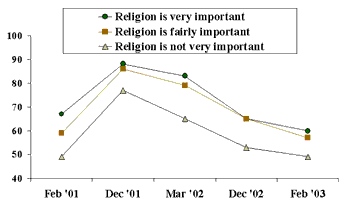 |
| George W. Bush Job Approval and Church Attendance in the Past Seven Days |
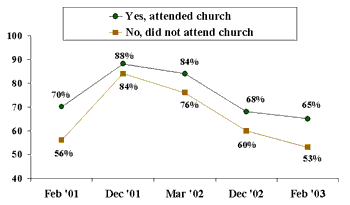 |
| George W. Bush Job Approval and Whites Who Are Born-Again or Evangelical |
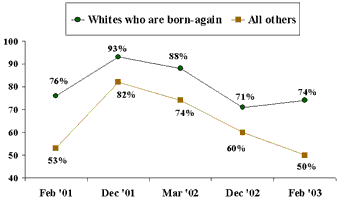 |
| George W. Bush Job Approval and Whites Who Are Protestant |
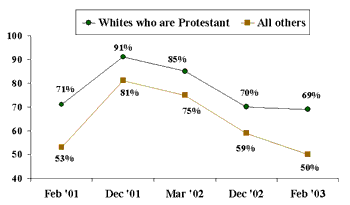 |
| George W. Bush Job Approval and Whites Who Are Born-Again and Protestant |
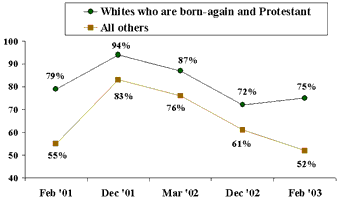 |
The basic conclusions:
- Those for whom religion is not very important are significantly less likely to approve of the job Bush is doing than those for whom religion is either fairly or very important.
- Those who have attended church within the last seven days are more likely to approve of the job Bush is doing than those who did not.
- White Protestants are much more likely than others to approve of the job Bush is doing.
- Whites who are born-again, and in particular white born-again Protestants, give Bush much higher job approval ratings than do others. In the most recent Gallup Poll, the difference between these two groups is 23 percentage points.
Survey Methods
The results below are based on telephone interviews with a randomly selected national sample of 5,055 adults, aged 18 and older, from five polls conducted between February 2001 and February 2003. For results based on this sample, one can say with 95% confidence that the maximum error attributable to sampling and other random effects is ±2 percentage points. In addition to sampling error, question wording and practical difficulties in conducting surveys can introduce error or bias into the findings of public opinion polls.
|
George W. Bush Job Approval and Attitudes |
||||
|
Approve |
Disapprove |
No opinion |
||
|
% |
% |
% |
||
|
White, Born-Again Protestants |
||||
|
2003 Feb 17-19 |
69 |
27 |
4 |
=100% |
|
2002 Dec 9-11 |
70 |
26 |
4 |
=100% |
|
2002 Mar 18-20 |
85 |
10 |
5 |
=100% |
|
2001 Dec 14-16 |
91 |
7 |
2 |
=100% |
|
2001 Feb 19-21 |
71 |
17 |
12 |
=100% |
|
All Others |
||||
|
2003 Feb 17-19 |
50 |
44 |
6 |
=100% |
|
2002 Dec 9-11 |
59 |
36 |
5 |
=100% |
|
2002 Mar 18-20 |
75 |
20 |
5 |
=100% |
|
2001 Dec 14-16 |
81 |
15 |
4 |
=100% |
|
2001 Feb 19-21 |
53 |
25 |
22 |
=100% |
|
George W. Bush Job Approval and Attitudes |
||||
|
Approve |
Disapprove |
No opinion |
||
|
% |
% |
% |
||
|
Whites Who Are Born-Again |
||||
|
2003 Feb 17-19 |
74 |
22 |
4 |
=100% |
|
2002 Dec 9-11 |
71 |
25 |
4 |
=100% |
|
2002 Mar 18-20 |
88 |
8 |
4 |
=100% |
|
2001 Dec 14-16 |
93 |
5 |
2 |
=100% |
|
2001 Feb 19-21 |
76 |
12 |
12 |
=100% |
|
All Others |
||||
|
2003 Feb 17-19 |
50 |
45 |
5 |
=100% |
|
2002 Dec 9-11 |
60 |
35 |
5 |
=100% |
|
2002 Mar 18-20 |
74 |
20 |
6 |
=100% |
|
2001 Dec 14-16 |
82 |
14 |
4 |
=100% |
|
2001 Feb 19-21 |
53 |
27 |
20 |
=100% |
|
George W. Bush Job Approval and Attitudes |
||||
|
Approve |
Disapprove |
No opinion |
||
|
% |
% |
% |
||
|
White, Born-Again Protestants |
||||
|
2003 Feb 17-19 |
75 |
22 |
3 |
=100% |
|
2002 Dec 9-11 |
72 |
23 |
5 |
=100% |
|
2002 Mar 18-20 |
87 |
7 |
6 |
=100% |
|
2001 Dec 14-16 |
94 |
5 |
1 |
=100% |
|
2001 Feb 19-21 |
79 |
13 |
8 |
=100% |
|
All Others |
||||
|
2003 Feb 17-19 |
52 |
42 |
6 |
=100% |
|
2002 Dec 9-11 |
61 |
35 |
4 |
=100% |
|
2002 Mar 18-20 |
76 |
19 |
5 |
=100% |
|
2001 Dec 14-16 |
83 |
13 |
4 |
=100% |
|
2001 Feb 19-21 |
55 |
25 |
20 |
=100% |
|
George W. Bush Job Approval and Religion |
||||
|
|
|
|
Whites who are born-again and Protestant |
|
|
% |
% |
% |
% |
|
|
Approve of Bush |
||||
|
2003 Feb 17-19 |
58 |
69 |
74 |
75 |
|
2002 Dec 9-11 |
63 |
70 |
71 |
72 |
|
2002 Mar 18-20 |
79 |
85 |
88 |
87 |
|
2001 Dec 14-16 |
86 |
91 |
93 |
94 |
|
2001 Feb 19-21 |
62 |
71 |
76 |
79 |
